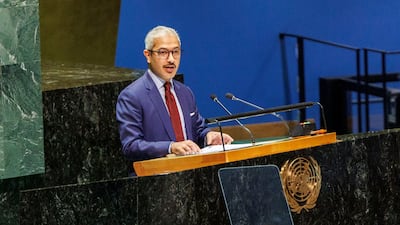Follow our live coverage on the UN General Assembly
As the 79th session of the UN General Assembly's high-level debate begins on Tuesday, key global challenges such as the wars in Gaza, Ukraine and Sudan as well as climate change are likely to dominate the agenda - and the UAE sees solving these crises as a priority.
Speaking exclusively to The National on the eve of the high-level debates, Mohamed Abushahab, the UAE’s permanent representative to the UN, stressed the importance of finding solutions to these crises as well as delivering humanitarian aid to those suffering in conflict zones.
"One of the UAE's priorities is many of the geopolitical crises that will remain at the forefront of international discussions," said Mr Abushahab.
"Whether we're talking about Ukraine, Gaza or Sudan, efforts should be guided by the UN charter and its principles," he emphasised the UAE's will steadfastly advocate for e-escalation, dialogue and peaceful resolution of conflicts.
"The UAE remains a pragmatic and principled voice at the UN, and this continues to be our approach across our foreign policy," he said, adding that during the UAE's council term, but also outside of the council term, "we've shown that by being principled so people know exactly where we stand, but also being pragmatic in order to be able to play a positive and constructive and bridge building role."
The UAE envoy also stressed the humanitarian dimension of his country's priorities, noting its status as one of the largest contributors to global aid. The challenge, he said, lies in securing humanitarian access in conflict zones.
"We must leverage UN mechanisms to ensure that international humanitarian law is upheld and aid reaches those in need," Mr Abushahab added.
On the Gaza crisis, the ambassador described the situation as "unbearable" and renewed the UAE's call for a ceasefire, the release of hostages and detainees and the resumption of a political process towards a two-state solution.
He expressed support for full UN General Assembly membership for Palestine, advocating its recognition "like any other nation".
But in the meantime, he said, progress is being made towards the goal and objective within the realm of what is possible.
Mr Abushahab said that Sudan is considered to be "very much a part of our region, and what happens there, of course, has the potential to impact its neighbours and the Horn of Africa and beyond".
He reaffirmed the UAE's continued position on the need for an immediate and permanent ceasefire, unhindered, safe, rapid, and sustained passage of humanitarian assistance in and across Sudan, and engagement in peace talks in good faith to transition to civilian-led governance.
Beyond political crises, sustainable development also remains a key focus for the UAE at UNGA.
"Coming off the work that we did on the UN Security Council and the unprecedented success of Cop28 [in Dubai], we will follow through on climate agreements and strenghten climate action and issues around water," Mr Abushahab said.
"We have every intention to continue to do that, also for the 2026 water conference."
The water conference, which aims to accelerate the implementation of sustainable development goals focused on clean water and sanitation, is set to be held in the UAE in December 2026.
The conference is expected to play a crucial role in accelerating global action on water issues as the world faces increasing pressure from climate change, population growth and resource scarcity. According to the UN, a quarter of the world's population have no access to safe drinking water while half lack basic sanitation.
The World Meteorological Organisation reports that 3.6 billion people currently face water shortages at least one month each year. The organisation warns that this number could rise to five billion – more than half the world's population – by 2050.
Emerging technologies and in particular artificial intelligence is another priority, Mr Abushahab said, highlighting the opportunities and risks AI poses across sectors, from sustainable development and energy development and security.
AI, he said, can be a "game changer in many sectors". "By co-operating, including here at the UN, and looking at what kind of guardrails and what kind of global ground rules we can have, we can mitigate the potential risks, and there are plenty of opportunities," he added.
The ambassador reaffirmed the UAE’s focus on empowering women and girls, as well as promoting tolerance and peace. He pointed to the UAE's landmark UN Security Council Resolution 2686, which addresses the links between hate speech, extremism, intolerance and conflict.
In June 2023, the UN Security Council unanimously adopted a resolution acknowledging the role of hate speech, racism and other forms of intolerance in fuelling conflicts. Jointly drafted by the UAE and UK, the resolution highlighted the adverse effects of gender discrimination and acts of extremism on global peace and stability.
"The Security Council recognised the link between hate speech, extremism, intolerance and racism and its role in contributing to either the outbreak or the intensification and recurrence to conflict. This is really about strengthening the UN's preventive abilities in order to build some resilience in societies against hate speech and extremism and intolerance," he said.


